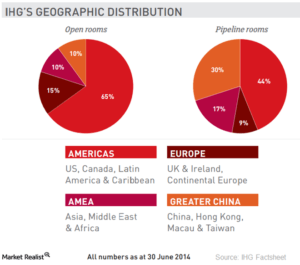Intercontinental Hotel Group: Making Sleep Sustainable

Intercontinental Hotel Group, the #3 hotel group globally, is tackling climate change on its surface but failing to address the problem at its core.
Intercontinental Hotel Group is the third largest hotel chain globally [1], with 754,265 rooms in 5,099 hotels spread across each region of the world. IHG franchises over 4,000 of these hotels and operates 824 themselves [2].
Climate Change Risks Threatening IHG
As a result of their global footprint and intensive building management requirements, they will inevitably be effected by climate change in 3 key ways:
- Given their global scope, they will inevitably face regulation on properties in specific countries, whether that be cap and trade rules or carbon taxes.
- Their consumers will demand a certain level of sustainability from their services or else they will opt to work with competitive hotel groups.
- Since infrastructure is their livelihood and appetite for travel drives their revenues, they will be negatively impacted by both the increased prevalence of natural disasters and the rising sea levels that threaten their properties in low-lying cities.
Going Green One Guest at a Time
In order to mitigate these issues IHG has already taken a number of steps to work towards a more sustainable business model. First, and most importantly, they opted to lower their water and energy consumption and carbon emissions rather than pay carbon taxes in order to continue operating at their current standards.[3] They set water and carbon reduction targets for their entire portfolio of hotel brands for 2013-2017: 12% reduction in carbon footprint per occupied room and 12% reduction in water use per occupied room in water-stressed areas. In 2015 they achieved a 3.9% reduction in their carbon footprint per occupied room, a 4.8% reduction of water consumption per occupied room in water-stressed areas, and a cost savings of $86M through the implementation of 34,389 green solutions.[3]
They also created the IHG Green Engage system, which compiles online carbon, energy and water usage data, in order to better enable their hotels to manage consumption and take action to reduce consumption over time. IHG Green Engage also recommends over 200 green solutions such as
- Switching to energy efficient lighting
- Installing low flow bathroom fixtures
- Harvesting rainwater
- Using energy efficient appliances [3]
Additionally, some hotels have partnered with third parties to recycle used toiletries and distribute them to communities in need [4]. Finally, Holiday Inns in America have asked their guests to be more environmentally friendly, by offering them points from the IHG Rewards Club, their loyalty program, in reward for participating in their “A Greener Stay” program, which minimizes housekeeping services [4].
Changing the Sheets but Not the Bed: Recommendations for How IHG Can Get Structural with its Green Initiatives
While their actions are laudable, they are mostly cosmetic and non-binding. Their goals are not enforced through any strict policies and all green initiatives are suggestions, rather than requirements, from IHG corporate. Additionally, their goals are pretty moderate as they aim to reduce usage by only 12% and only in specific regions for water consumption.
IHG should work on more impactful changes that require structural changes to business operations, not just improvements upon the existing model. For instance, instead of just replacing incandescent bulbs with LED bulbs, they should wire rooms to require key cards to be inserted into the wall to activate the lights. This feature is common across hotels in Europe but is almost nonexistent in the United States, leading to wasted electricity when lights are left on while guests are out of their rooms. Additionally, instead of sending half-used mini-bottles of shampoo, conditioner, body wash, and lotion to communities in need, they should replace mini-bottles altogether with refillable installed toiletry canisters. This would reduce plastic waste and eliminate the need to transport their used toiletries to another location, which in it of itself necessitates the use of fuel and creates additional carbon emission.
Moreover, the largest contributor to carbon emission is the buildings themselves. IHG has 1,461 hotels in its pipeline. It should require that all of these hotel be LEED certified. It should also retrofit its existing buildings to improve insulation and water consumption. Without these more intensive changes they will never see meaningful reductions in their carbon, energy and water consumption.
(652 words)
- http://www.hotelnewsnow.com/Articles/28560/The-10-largest-hotel-companies-by-room-count
- https://www.ihgplc.com/about-us/our-global-presence
- https://www.ihgplc.com/responsible-business/corporate-responsibility/environmental-sustainability
- https://www.ihgplc.com/responsible-business/corporate-responsibility/environmental-sustainability/carbon-and-energy





Reading the article, it struck me that the initiatives discussed in the post were largely “top down”. As Caroline notes, these are solutions pushed outward from the corporate centre. Looking at the range of suggestions made by Regional Activity Centre for Sustainable Consumption and Production (www.cprac.org/docs/Diptico_Sector_Hotelero_Web.pdf), an organization focussed on the Mediteranean region, got me thinking about alternatives.
Capturing the engagement of hotel staff in sustainability will not only ensure that the top down efforts of the corporate center are effective, it will likely generate additional ideas for action by those on the ground, getting beyond the obvious. A further benefit one Orient Express Hotel property found was that ideas generated by staff were also implemented more quickly (http://www.greenhotelier.org/our-themes/community-communication-engagement/engaging-employees/) and the engagement of some staff became infectious across others. To maximize the effectiveness of its sustainability efforts, Intercontinental should actively involve its staff at all levels in idea generation as well as implementation.
I particularly liked your point about how many of the changes have been largely cosmetic – I couldn’t agree more.
That being said, I keep thinking back to the “root causes” of factors that can be changed to improve upon the sustainability for IHG. Two things come to mind:
1) Consumer awareness / motivation: At the end of the day, the guests staying at the hotels themselves need to be aware of the environmental ramifications of their actions if they leave their lights on. Using key cards that activate the lights in the rooms is not enough. Perhaps one thing IHG can do is really educate and engage the consumer on being more environmentally friendly – thoughts that come to mind are a) educational signage in the rooms on small things they can do to be eco-friendly, and b) offer some sort of “incentive” for customers to behave in an eco-friendly way (i.e. if they do not change their sheets during the duration of their stay, or manage to keep lights off when they’re not in the room, they get some sort of perk, like a 5% off their bill)
2) Employee awareness / motivation: Employees should also be motivated and incentivized to act in a more eco-friendly way. We’ve been learning about the “Balanced Scorecard” in our FRC class – perhaps improving upon sustainability of IHG can be one of the measures in which employees are rated on and held accountable for as part of their performance reviews.
I agree that their efforts are laudable but largely cosmetic, as you put it Caroline. One thing that alarmed me was that they measure these by “occupied rooms” which seems like an easy way out of looking hard at inefficiencies across the system and whether, for instance, they need such a big hotel in that location, or whether they are dealing with low occupancy in the most efficient way. They should definitely look into green building techniques for new and renovated hotels in their chain. I think that creating energy efficient infrastructures will be the best way for them to reduce emissions as a global brand while not harming – in fact, possibly enhancing – the customer experience.
I completely agree that LEED certifications should be a requirement for hotel development. Marriott has been encouraging its owners/franchisees to move towards LEED, but it is only a soft recommendation. Similar to other hotel companies, IHG could also provide their Green Engage system data to their large corporate clients who are interested in sending their group/conference business to hotels that have low carbon footprints.
From my perspective, it seems the company is participating in “green” efforts to protect their interests and not so much for good of humanity. For example, tracking their carbon footprint is in the company’s best interest in terms of trying to keep operating costs low; IHG will be impacted from foreign governments exercising a carbon tax.
I agree that IHG should start to do more strategic standards that would not be “cosmetic” and go to the root causes of their environmental impact. In this era where most of the buildings are being certified LEED and the hospitality industry itself if turning into having this certification from the design of their hotels itself, IHG being a leader in the sector should be the one proposing these standards instead of being left behind.
Another important consideration that IHG needs to start thinking about is the locations of its hotels that are impacted directly by meteorological phenomena that not only put in risk their real estate but also the community where they are located. As said before it is not enough to distribute the toiletries that are recycled with the communities in need, it would be much more beneficial is they find a way to create a partnership with them and local organizations that would start to define a contingency plan for those catastrophes and create the plan of action of how to better manage the environmental impact the hotels are having in those areas.
Very interesting post! I particularly liked how Intercontinental is now rewarding their customers if they adopt “green” practices. We usually see nudging activity coming from governments but I would argue that private firms could play a big role to push for a culture of sustainability. It will take time but do you think guest’s options should be limited? I can envision a world in which hotel rooms used all recycled toiletries, set limits on showering, and set boundaries for the use of AC. That being said, I do not know if carrots like reward programs will end up being more efficient than sticks like key cards to activate lights.
Your article raised a number of interesting points about the steps that IHG is beginning to take to increase sustainability, such as setting water and carbon reduction targets for their portfolio of hotel brands. Because of the nature of the hotel business, in which guests occupy a major portion of each property, and therefore have a large impact on how much energy, water, etc. is used each day, I wonder how much of a trade-off management feels that they have to make between providing a more upscale, luxury experience versus working to shift towards a more eco-friendly, sustainable visit. At the more upscale, premium hotels, is there a dichotomy between providing ultimate service and customer satisfaction while suggesting guests hang up towels rather than request new ones or hold off on having sheets replaced? This is an interesting question for the hotel industry to ponder as we move into an age of increased focus on sustainability. How will management work to influence and inspire guests to act in an eco-friendly manner, and ultimately, how much control over the actions of guests will hotels have? Is there a risk that IHG could lose guests to other luxury competitors who don’t require this of guests?